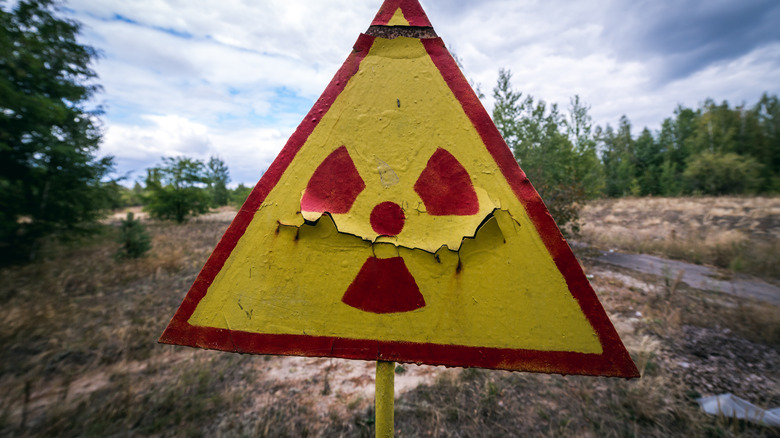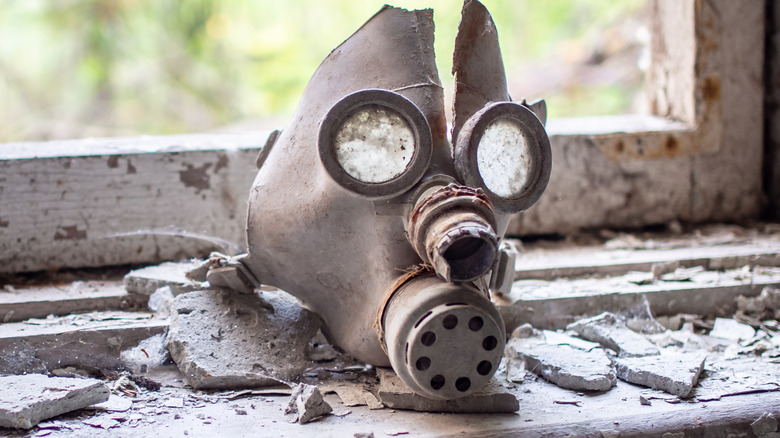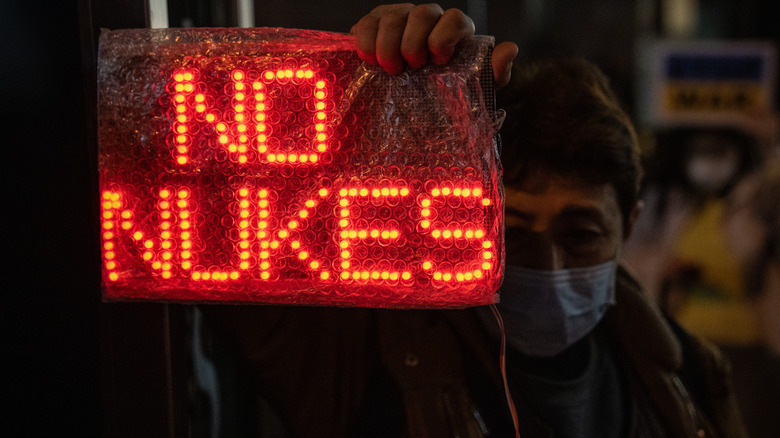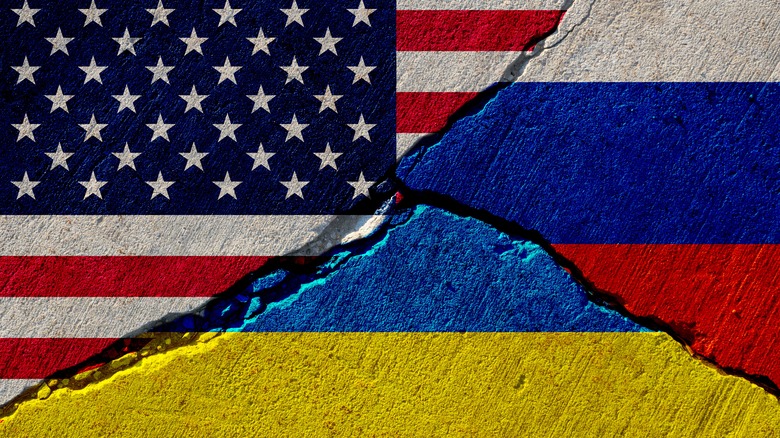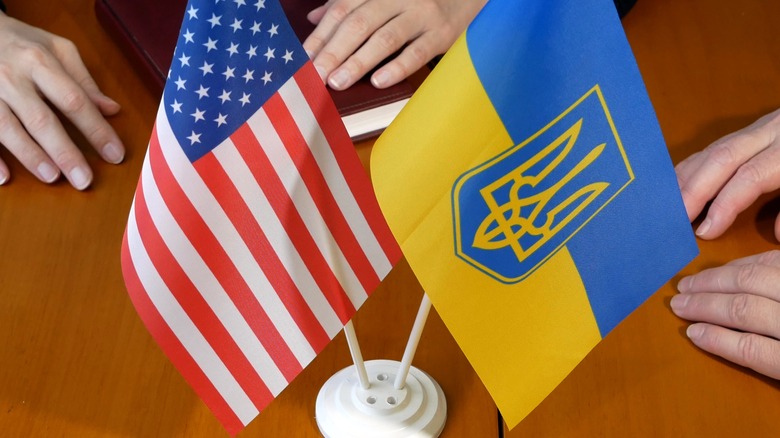Why Ukraine Doesn't Have Nuclear Weapons
The Eastern European nations of Ukraine and Russia have a long and complex relationship. In 1922, Ukraine became one of the original member states in the Union of Soviet Socialist Republics, or the USSR, the global Communist superpower headquartered in Moscow, the capital of Russia. For decades, Ukraine fell under the strict control and purview of the Soviet Union until 1991, when it became independent thanks in part to a national referendum but mostly because of the end of European communism, the end of the Cold War, and the dissolution of the Soviet Union into various independent countries.
Ukraine is strategically located — it's a bridge from the powerful, Vladimir Putin-run Russia to Poland, and then Western Europe — and a source of lucrative natural resources. In February 2022, Putin's forces invaded and began laying siege to Ukraine, with the president asserting that the land has no claim to independence. The populace and its military alike united to defend the country from Putin's troops, but with this ugly revival of a West vs. Russia-flavored conflict, Cold War fears of nuclear war have returned, too. While Russia remains a nuclear power, Ukraine doesn't have the option of an atomic offense or defense, because the country isn't in possession of such weaponry, or at least, it no longer is. Here's why Ukraine doesn't have nuclear capabilities.
Ukraine was once a nuclear stronghold
"The Cold War" is the umbrella term of the decades-long detente between the Soviet Union-led bloc of communist nations and the United States and its democratic allies. The war was cold because shots were never fired and bombs were never dropped — because both the U.S. and USSR contingents were in possession of huge stockpiles of nuclear weapons, neither collective used them, knowing that the other would immediately respond in kind, resulting in "mutually assured destruction."
Nevertheless, the West and the Soviets had weapons trained on one another and strategically placed. The Soviet Union, according to the Federation of American Scientists, stored about 5,000 nuclear devices in Ukraine, one of the republics in the Union of Soviet Socialist Republics. When the Cold War ended in 1991, following the fall of the Berlin Wall and the sudden and full dissolution of the USSR, those 5,000 nuclear warheads were left behind in the now-independent nation of Ukraine. That made the country the world's third-biggest nuclear power on Earth, behind Russia (where the majority of Soviet nukes remained) and the United States, according to the New York Times.
Ukraine purposely divested its nuclear weapons
Thirty years removed from the fall of the Soviet Union, the end of the Cold War, and inheriting a massive load of nuclear arms, Ukraine is no longer in possession of those weapons of mass destruction and hasn't had them in a long time. According to the Arms Control Association, Ukraine began the long process of nuclear divestiture, purposely ridding itself of nuclear weapons so as to pursue more pressing and practical concerns. In 1993, Ukraine's government signed the Treaty on the Non-Proliferation of Nuclear Weapons, a United Nations agreement that went into effect in 1970 in which member states agreed to stop or limit nuclear production. As part of the similar, post-Cold War Strategic Arms Reduction Treaty and disarmament-minded Lisbon Protocol, Ukraine sent away the last of its nukes in 2001.
The Lisbon Protocol's aim: to return Soviet arms stationed in Ukraine, Belarus, and Kazakhstan to the dominant Soviet state and now independent Russia. In return for getting rid of all those nuclear weapons, Ukraine was assured substantial foreign aid (including from the United States) to help it develop as a newly autonomous country, as well as promises of security and defense.
Ukraine was promised international protection should it denuclearize
Just the idea that a country has nuclear weapons — and is willing to use them — is a strong statement of defense. It's a big reason why the U.S. and the USSR were considered so powerful and seen as nations not to be trifled with for so long, because they could theoretically atomically annihilate anyone who crossed them, including each other. There isn't anything that really trumps nuclear weapons, so why did Ukraine give up the guarantees of national protection that come with atomic ownership? It's because in the wake of the Cold War's end, and the tremendous relief it brought when nuclear armageddon had been seemingly avoided, former Soviet republics willingly denuclearized in favor of a less lethal, less heated approach to national security.
In 1994, Ukraine's highest governmental officials, according to NPR, signed the Budapest Memorandum. The United States and the United Kingdom, also agreed to the document, pledging security, in the form of military and other forms of stiff protection, to Ukraine. In other words, by giving up its nuclear weapons, Ukraine got a guarantee from the mighty U.S. and U.K. that they'd be protected by any outside threat.
However, and this is where things get tricky, another country also signed the Budapest Memorandum: Russia. The country that swore to protect Ukraine is the same one that invaded it in early 2022.
Ukraine reaffirmed its non-nuclear status
The 2022 Russian military campaign in Ukraine isn't the first time that one former Soviet republic entered into another. In 2014, according to the Brookings Institute, soldiers without national insignia, later revealed by Russian president Vladimir Putin to be acting under his orders, violently seized (per BBC) the Crimea region of Ukraine, claiming it for Russia and annexing it into that country within a matter of weeks. That military action and subsequent political seizure was reportedly a violation of the Budapest Memorandum, as Russia was supposed to protect Ukraine from outside military actions, not be the root of one.
In losing Crimea, Ukraine essentially got rid of its Soviet-era nuclear stockpile for nothing. And yet, in the wake of the Crimean annexation, the government of Ukraine recommitted itself to the goals and philosophy of nuclear nonproliferation. In a joint statement with the White House, representing the U.S. government, a signer of the Budapest Memorandum, Ukraine said it would "not recognize Russia's illegal attempt to annex Crimea," as the region "is an integral part of Ukraine." In the official communique, the U.S. and Ukraine swore their pledge of "upholding their nuclear nonproliferation commitments." That means that even though the other side had broken its promise, Ukraine would not be going out and replacing its disappeared nuclear weapons anytime soon.
